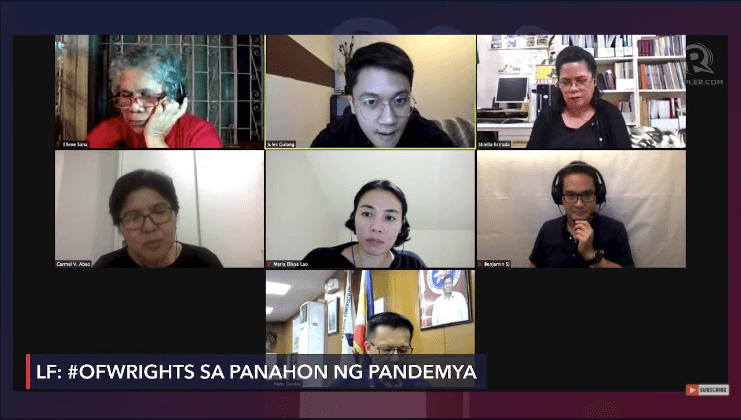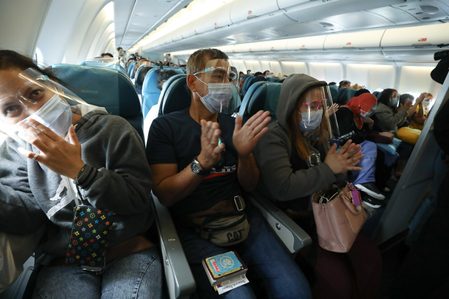SUMMARY
This is AI generated summarization, which may have errors. For context, always refer to the full article.

More than a year into the coronavirus pandemic, many concerns that overseas Filipino workers (OFWs) faced when the public health crisis first emerged still persist, academic researchers found.
“Many concerns at the beginning of the pandemic, hanggang ngayon (until now) we still hear these concerns…as the pandemic moves into its second year,” said Maria Elissa Lao, member of the Ateneo de Manila University (ADMU) working group on migration (WGM), on Thursday, August 12.
In a webinar organized together with MovePH and the Center for Migrant Advocacy (CMA), the ADMU group said OFW concerns include how hours had been extended for domestic work, the fear of being stranded in their host countries, and the fear of difficulty in finding a new job if they return to the Philippines.
In their consultations with OFWs for their research, Lao said one sentiment heard was, “Sa panahon kasi ngayon, kailangan mong mahalin ang trabaho mo (At times like these, you have to love your job).”
According to the Department of Labor and Employment (DOLE), at least 760,138 OFWs have been affected by the pandemic.
Pushing to send money
ADMU WGM member Carmel Abao, citing data from the Bangko Sentral ng Pilipinas, noted how annual remittances from OFWs rose steadily from 2016 to 2019 – from around $26 billion to $30 billion – but dipped to $29 billion during the pandemic.
However, from January to May 2021, there was an increase in remittances compared to the same period in 2020, despite the ongoing pandemic-induced economic crisis.
Abao said one explanation could be the exchange rate, as the peso strengthened against the US dollar and OFWs had to send more dollars to make up for the difference. But she also cited the other possibility that OFWs may be exerting extra effort to send more help to their families.
“Posible din na talagang kumakayod nang husto ang mga OFW natin. Posibleng tinitipid nila ‘yung sarili nila para makapagpadala sila ng pera sa pamilya. Wala pa ngang pandemic, meron na tayong mga naririnig na ganoon, ‘di ba?” said Abao.
(It’s also possible that our OFWs are working extra hard. It’s possible that they’re spending less on themselves so they can send more money to their families. Even before the pandemic, we’ve heard stories like this, right?)
Even after the pandemic, ADMU WGM member Benjamin San Jose said the government would need to work on strengthening social safety nets for OFWs, whether they are abroad or returning to the Philippines.
For instance, San Jose said there should be a larger role of public employment service offices (PESO) where local government units (LGUs) and the DOLE coordinate to assist in hiring processes, and give career counseling.
Migration should be mainstreamed in local development planning, San Jose said. LGUs can also push for projects for repatriated OFWs.
OWWA: Give us the names, we’ll help them
Shiella Estrada of the Progressive Labor Union of Domestic Workers-Hong Kong lamented how, despite the available programs and efforts from the government for OFW assistance, there are still many distressed OFWs.
“Lahat ba talaga ay nabigyan ng pare-parehas na tulong na mga nauwing OFWs (Did all returning OFWs receive the same assistance)?” she asked.
Estrada also questioned the need for the proposed OFW department, saying the government should focus more on how to serve OFWs better.
In response, Overseas Workers Welfare Administration (OWWA) chief Hans Cacdac promised to extend help to OFWs in need. He explained that the economic crisis and the undersupply of government benefits were “scenarios that overlap.”
Cacdac reported in the webinar that from 2020 to 2021, the OWWA gave around 62,000 scholarships to OFW families. He said that because they are not in organized labor groups like Estrada’s, “you never hear about them.”
“‘Yung organized groups such as Shiella’s group, give us the names. Give us the people who need help and we will help them. ‘Yun ang promise ko. Kasi mas kontrolado natin sitwasyon ‘pag ganoon, kaysa sa pangkalahatan na,” said Cacdac.
(Give us the names from organized groups such as Shiella’s. Give us the people who need help and we will help them. That is my promise. Because we can control the situation better this way, rather than dealing with the sheer number of all.)
The OWWA has been assisting returning OFWs in their quarantine protocols, from bringing them to their hotels, heeding their medical needs, and transporting them back to their home provinces. – Rappler.com
Add a comment
How does this make you feel?



![[Time Trowel] Evolution and the sneakiness of COVID](https://www.rappler.com/tachyon/2024/02/tl-evolution-covid.jpg?resize=257%2C257&crop=455px%2C0px%2C1080px%2C1080px)


There are no comments yet. Add your comment to start the conversation.